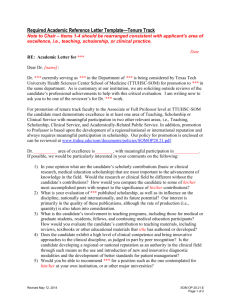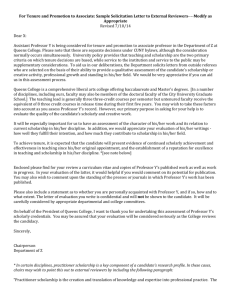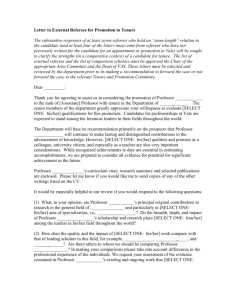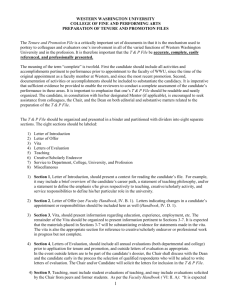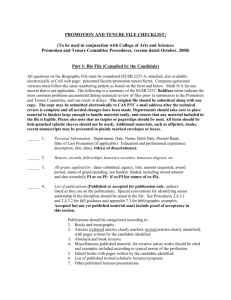The University recognizes that evidence of excellence in scholarship
advertisement
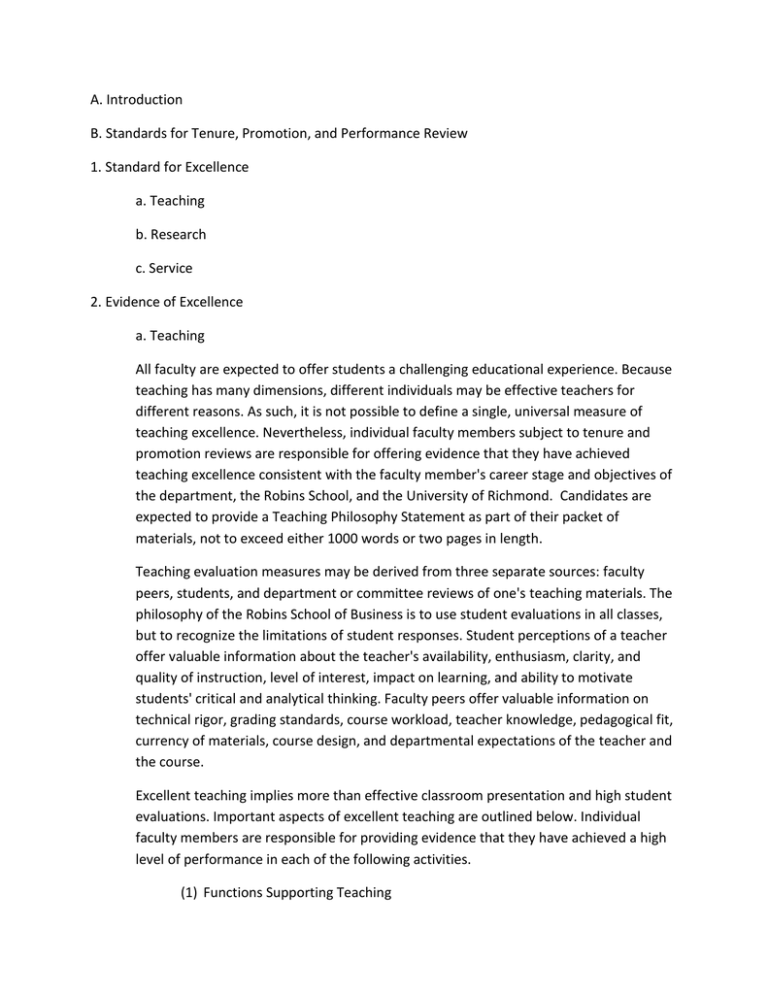
A. Introduction B. Standards for Tenure, Promotion, and Performance Review 1. Standard for Excellence a. Teaching b. Research c. Service 2. Evidence of Excellence a. Teaching All faculty are expected to offer students a challenging educational experience. Because teaching has many dimensions, different individuals may be effective teachers for different reasons. As such, it is not possible to define a single, universal measure of teaching excellence. Nevertheless, individual faculty members subject to tenure and promotion reviews are responsible for offering evidence that they have achieved teaching excellence consistent with the faculty member's career stage and objectives of the department, the Robins School, and the University of Richmond. Candidates are expected to provide a Teaching Philosophy Statement as part of their packet of materials, not to exceed either 1000 words or two pages in length. Teaching evaluation measures may be derived from three separate sources: faculty peers, students, and department or committee reviews of one's teaching materials. The philosophy of the Robins School of Business is to use student evaluations in all classes, but to recognize the limitations of student responses. Student perceptions of a teacher offer valuable information about the teacher's availability, enthusiasm, clarity, and quality of instruction, level of interest, impact on learning, and ability to motivate students' critical and analytical thinking. Faculty peers offer valuable information on technical rigor, grading standards, course workload, teacher knowledge, pedagogical fit, currency of materials, course design, and departmental expectations of the teacher and the course. Excellent teaching implies more than effective classroom presentation and high student evaluations. Important aspects of excellent teaching are outlined below. Individual faculty members are responsible for providing evidence that they have achieved a high level of performance in each of the following activities. (1) Functions Supporting Teaching (2) Course Specific Standards and Rigor In a course assigned to a specific faculty member, excellent teaching is represented by the teacher's appropriate degree of rigor, design of graded assignments, and currency of teaching materials. A faculty member's syllabus, writing exercises, problem sets, grading standards, and other relevant material are the sources of information that may be used to judge the quality of teaching in a specific course. Faculty members must include course specific grade distributions, available from the Registrar’s office, for each semester they have taught at the University of Richmond. (3) Student Evaluations of Teaching Performance Standardized teaching evaluations are administered in every course. A major use of the evaluations is self-improvement; faculty members are responsible for interpreting evaluations and adjusting their courses if necessary. Department Chairs and mentors of untenured faculty members actively work with newer faculty to interpret the evaluations and to consider adjustments to classroom activities. Student opinions are solicited and respected, but the information provided by students is judged in the context of departmental and the Robins School of Business standards and expectations. Nevertheless, consistently weak student evaluations will jeopardize a candidate's case for tenure or promotion unless a very strong case of teaching excellence is made from other evidence on teaching ability. Candidates must include all open-ended comments from course evaluations and their Summary of Student Evaluations table for each course taught. (4) Teaching Materials b. Scholarship Scholarship is necessary for the fulfillment of the University of Richmond's goal of advancing knowledge. Scholarship supplements and strengthens the University's commitment to the highest possible quality of teaching. Scholarship of high quality advances the body of knowledge in the various business disciplines, signifies faculty quality in the disciplines, enhances the University's academic prestige, and provides direction for intellectual activity. The University recognizes that evidence of excellence in scholarship can take a variety of forms. It also recognizes that any form of scholarship, to reach its fullest potential, must be shared and tested publicly. Typically, the primary form of such evidence is in publications that are open to scrutiny by professional peers. In addition, excellence in scholarship is also judged by its focus and whether it represents a sustained level of intellectual inquiry. Candidates are expected to include a Research Statement in their portfolio of materials that provides a summary of their intellectual contributions and research focus (not to exceed either 1000 words or two pages in length). (1) (2) (3) (4) Scholarly Publications Research Focus Sustained Intellectual Inquiry Exceptional Cases c. Service The University of Richmond and the Robins School rely on active and regular involvement of faculty. Hence, service duties, such as advising, committee work, and extracurricular activities supporting the school's mission, are an essential responsibility of the faculty. Every candidate for tenure and promotion is expected to demonstrate that he or she has played an effective part in the affairs of his or her department, the Robins School and/or the University. Candidates are expected to include a Service Statement in their portfolio of materials that provides a summary of their service contributions (not to exceed either 1000 words or two pages in length). Excellence in service implies a high level of collegiality where faculty work together to accomplish the service mission. Evaluations of service and teamwork may be solicited from Department Chairs, Committee Chairs, and colleagues as part of any tenure or promotion review. Service excellence is achieved through regular, effective, and active participation in the affairs of the University, School, and department. A faculty member's service to the business discipline and the external community is also evidence of service contributions. 3. Standards for Tenure and Promotion to Associate Professor 4. Standards for Promotion to Full Professor C. Tenure and Promotion Process and Procedures 1. Mid-Term Review 2. Tenure and Promotion to Associate Professor a. Composition and Election of the Tenure and Promotion Review Committee b. Tenure and Promotion: External Letters After the Tenure and Promotion Review Committee receives these names, the Chair sends a standard cover letter to each of the reviewers soliciting a written review of the quality of the candidate's scholarship. The cover letter requests external reviewers to summarize their relationship with the candidate as well as evaluate a sample of the candidate's scholarship and the candidate's overall contributions in scholarship based on the candidate's vita. Materials sent out for review include the candidate's vita, a research statement prepared by the candidate (not to exceed 1000 words or two pages in length), scholarship products selected by the candidate, and a copy of the "Standards, Procedures, and Process for Tenure, Promotion, and Ongoing Faculty Performance Reviews in the Robins School of Business." The cover letter also requests that each reviewer attach his or her vita to the review. External reviews received by the Tenure and Promotion Review Committee become part of the candidate's materials. All external reviews and vitae are treated as confidential and are removed before the materials are returned to the candidate. c. Tenure and Promotion: Department’s Role In the case of tenure, which normally includes promotion to Associate Professor, the tenured members of the candidate's department (excluding that department's member of the Tenure and Promotion Review Committee) meet to evaluate the candidate's performance. The department discusses the portfolio submitted by the candidate, the external review letters, and the candidate's performance in relation to the standards of excellence. Based on this meeting, the Chair of the department forwards a written recommendation to the Tenure and Promotion Review Committee and the Dean following the Dean's timetable, which must allow no less than 15 business days from the due date of the tenure portfolio. This recommendation should be a summary of the committee's discussion and include a critical analysis of the strengths and weaknesses of the candidate, a discussion of how the candidate's position relates to the current and future needs of the department, and the reasoning and evidence that supports the majority and any dissenting opinion. The written recommendation is signed by each tenured member of the department and includes the departmental vote. Tenured members of the department with dissenting votes may also forward a written analysis to the Tenure and Promotion Review Committee and the Dean. The Department Chair notifies the candidate of the department's vote count in writing, normally within two business days after the report is forwarded to the Chair of the Tenure and Promotion Committee. In the event of a negative recommendation, the written notification will include summary of the rationale behind the recommendation. d. Tenure and Promotion: Tenure and Promotion Committee’s Role e. Tenure and Promotion: Dean’s Role f. Promotion to Associate Professor when Tenure and Promotion are not Linked 3. Promotion to Full Professor and the Full Professor Committee a. Promotion to Full Professor: External Letters The candidate and the candidate's department provide the Full Professor Committee Chair with a list of at least six names for external review letters. Three reviewers are selected by the candidate, and three reviewers are selected by the Department Chair, with the advice of tenured members of the department. The Department Chair must contact the reviewers to make sure they are willing to provide a timely review. Outside reviewers should be selected carefully to make sure reviewers are respected members of the candidate's discipline who have an arm's-length relationship with the candidate and can objectively evaluate the candidate's intellectual contributions. As soon as reviewer names are forwarded to the Chair of the Full Professor Committee, a standard cover letter is sent by the Full Professor Committee Chair to each of the reviewers soliciting a written review of the candidate's scholarship. The cover letter requests external reviewers to summarize their relationship with the candidate as well as evaluate a sample of the candidate's scholarship and the candidate's impact on the literature in a specific area of specialization. Materials sent out for review include the candidate's vita, , a research statement prepared by the candidate (not to exceed either 1000 words or two pages in length), scholarship products selected by the candidate, and a copy of the "Standards, Procedures, and Process for Tenure, Promotion, and Ongoing Faculty Performance Reviews in the Robins School of Business." The cover letter also requests that each reviewer attach his or her vita to the review. External letters received by the Full Professor Committee become part of the candidate's materials to be reviewed at higher levels. All external letters and vitae are confidential and are removed before the materials are returned to the candidate. b. Promotion to Full Professor: Department’s Role c. Promotion to Full Professor: Full professor Committee’s Role d. Promotion to Full Professor: Dean’s Role 4. Tenure and Promotion for Outside Candidates as Part of the Hiring Process
